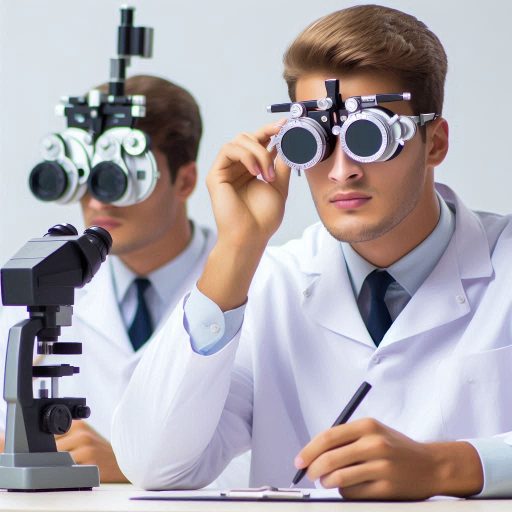Introduction
Optometry offers various specializations to address specific patient needs.
Each specialization allows optometrists to enhance their skills and knowledge.
Choosing a specialization in optometry is essential for professional growth.
It enables practitioners to provide targeted care and improve patient outcomes.
Specializing can lead to greater job satisfaction and increased demand for services.
Optometrists can work in areas such as pediatric care, sports vision, or low vision rehabilitation.
Each field presents unique challenges and rewards, making the choice significant.
This blog post discusses the different areas of focus within optometry.
We will explore several specializations, including pediatric optometry, contact lens specialization, and geriatric optometry.
Understanding these areas helps aspiring optometrists make informed career decisions.
Additionally, we will highlight the skills and training required for each specialization.
By examining these fields, we appreciate the diverse opportunities within the optometry profession.
Recognizing the importance of specialization allows optometrists to tailor their practice to better serve their patients.
Ultimately, specializations enhance the quality of eye care available to the public.
Optometry can significantly improve patient health and well-being through focused expertise.
Let’s explore the various specializations in optometry.
Overview of Optometry Specializations
Define What Optometry Specializations Are
Optometry specializations refer to focused areas of practice within the field of optometry.
These specializations allow optometrists to enhance their expertise in specific areas of eye care.
By concentrating on certain conditions or populations, they can provide better-targeted care to patients.
Common specializations include pediatric optometry, geriatric optometry, and ocular disease management.
Each specialization requires additional training and knowledge beyond standard optometry education.
This focused approach improves patient outcomes and addresses diverse vision health needs.
Why Optometrists May Choose to Specialize in a Particular Area
Optometrists often choose to specialize based on personal interests and career goals.
Specializing allows them to deepen their knowledge in areas they find most rewarding.
For instance, some optometrists are passionate about working with children, leading them to pursue pediatric optometry.
Others may focus on geriatric care, recognizing the unique needs of aging patients.
Additionally, some optometrists are drawn to ocular disease management due to the complexity of these conditions.
Specialization can enhance job satisfaction by aligning their work with their passions.
Moreover, specializing often leads to better career opportunities and higher earning potential.
Employers value specialized skills, making optometrists more competitive in the job market.
A specialized optometrist may also attract more patients seeking specific care.
This demand can lead to increased job security and career advancement opportunities.
Statistics on the Percentage of Optometrists Who Specialize in Different Areas
Statistics reveal that many optometrists opt for specialization.
According to the American Optometric Association (AOA), about 30% of optometrists specialize in a specific area.
Ocular disease is the most common specialization, followed by pediatric and geriatric optometry.
A significant portion also focuses on contact lens fitting and low vision rehabilitation.
In pediatric optometry, practitioners address the unique vision needs of children.
They provide essential eye exams, vision therapy, and corrective lenses.
Geriatric optometry focuses on age-related vision issues, ensuring older adults maintain quality eye health.
Optometrists specializing in ocular disease manage conditions like glaucoma, diabetic retinopathy, and macular degeneration.
Furthermore, many optometrists pursue additional training through residency programs or certifications.
These programs enhance their skills and knowledge, allowing them to provide specialized care.
The growth of telehealth and technological advancements also contribute to the demand for specializations.
As patients become more aware of eye health, they seek specialized care for their specific needs.
Optometry specializations allow practitioners to focus on targeted areas of eye care.
This focus improves patient care, job satisfaction, and career opportunities.
The statistics indicate a growing trend towards specialization within the optometry field, benefiting both practitioners and patients alike.
Read: Challenges and Rewards: The Dual Life of an U.S. Environmental Scientist
Specialization in Pediatric Optometry
Role of a Pediatric Optometrist
A pediatric optometrist focuses on the vision care of children, from infancy to adolescence.
They perform comprehensive eye exams tailored for young patients.
Their role includes diagnosing vision problems and eye conditions unique to children.
Pediatric optometrists also prescribe glasses or contact lenses when necessary.
They monitor children‘s vision development and overall eye health throughout their growth.
They work closely with parents and caregivers to educate them about eye care.
This education helps parents understand the importance of regular eye exams.
Pediatric optometrists often assess visual skills needed for learning.
These skills include eye coordination, focusing, and depth perception.
They also identify conditions like amblyopia, strabismus, and refractive errors.
By addressing these issues early, pediatric optometrists can prevent long-term vision problems.
They collaborate with other healthcare professionals, such as pediatricians, to ensure holistic care.
This teamwork ensures comprehensive monitoring of a child’s health, promoting healthy vision from a young age.
Importance of Early Eye Care for Children
Early eye care is crucial for children‘s overall development.
Vision plays a vital role in learning and daily activities.
Poor vision can significantly impact a child’s ability to succeed academically.
Many learning difficulties can stem from uncorrected vision problems.
Identifying and treating these issues early leads to better outcomes.
Children should receive their first eye exam at six months of age.
Regular check-ups throughout childhood help monitor their vision as they grow.
By age three, children should have another eye exam.
This helps catch any potential problems early on.
Parents should be aware of signs that may indicate vision issues.
Symptoms may include difficulty reading, squinting, or rubbing the eyes frequently.
Early intervention is essential to address these concerns effectively.
Skills and Training Required for This Specialization
Pediatric optometrists undergo extensive training to specialize in children‘s eye care.
They must first complete a Doctor of Optometry (OD) degree.
After obtaining their degree, many optometrists pursue a residency in pediatric optometry.
This residency provides specialized training in diagnosing and managing children’s vision issues.
In addition to technical skills, pediatric optometrists require strong communication skills.
They must effectively interact with children and their parents.
Creating a comfortable environment helps ease children‘s anxiety during exams.
Patience and empathy are essential traits for working with young patients.
Pediatric optometrists also need to stay updated on advancements in pediatric eye care.
This includes new treatment methods and emerging technologies.
Continuing education helps them provide the best care possible.
Pediatric optometrists play a vital role in children’s eye health.
Early eye care significantly impacts a child’s development and learning.
Specialized training equips pediatric optometrists with the necessary skills to succeed.
They help ensure children achieve their best visual potential, promoting a brighter future.
Read: Job Market Trends: Future of Chemistry Jobs in America
Specialization in Contact Lenses
Role of a Contact Lens Specialist
A contact lens specialist focuses on fitting and managing contact lenses for patients.
They assess individual needs and recommend the best lens options.
These specialists perform comprehensive eye exams to evaluate vision and eye health.
They also measure the curvature and size of the eye to ensure proper fit.
Contact lens specialists provide personalized fitting sessions for patients.
During these sessions, they educate patients about lens care and handling.
They explain how to insert, remove, and clean contact lenses effectively.
Specialists also address any concerns or discomfort experienced by patients during wear.
Their expertise helps in identifying patients who may benefit from specialized lenses.
These include patients with astigmatism, presbyopia, or keratoconus.
They tailor solutions to meet patients‘ unique visual needs and lifestyle preferences.
By doing so, contact lens specialists enhance patients‘ quality of life and vision.
Different Types of Contact Lenses
Contact lenses come in various types, each designed for specific needs.
Soft contact lenses are popular due to their comfort and flexibility.
They are available in daily, bi-weekly, and monthly disposables.
Rigid gas permeable (RGP) lenses offer sharp vision and durability.
They may require a longer adaptation period but provide excellent visual acuity.
Toric lenses correct astigmatism by providing different powers in various lens meridians.
Multifocal lenses assist patients with presbyopia by allowing clear vision at multiple distances.
Scleral lenses are larger, designed to vault over the cornea, and provide comfort for irregular corneas.
Specialty lenses are also available for patients with specific eye conditions.
These lenses cater to unique visual needs and improve comfort for wearers.
The variety of lenses allows specialists to find the right fit for each patient.
Benefits of Seeing a Contact Lens Specialist
Seeing a contact lens specialist offers numerous benefits for patients.
Specialists possess in-depth knowledge about contact lens options and fitting techniques.
They help ensure that patients receive the most suitable lenses for their eyes.
An accurate fitting improves comfort and minimizes complications.
Specialists monitor the patient‘s eye health throughout the contact lens wearing process.
They conduct regular follow-ups to assess lens performance and eye health.
Consulting a specialist reduces the risk of potential issues, such as infections or corneal abrasions.
They provide guidance on proper lens care, enhancing patient safety.
Education about lens maintenance significantly contributes to the longevity of lenses.
Additionally, contact lens specialists stay updated on advancements in lens technology.
This enables them to offer the latest options available in the market.
By choosing to see a contact lens specialist, patients gain access to customized solutions.
They also enjoy enhanced comfort, vision, and overall eye health.
Contact lens specialists play a vital role in enhancing patients’ vision.
Their expertise ensures proper fitting, care, and management of contact lenses.
By understanding the different types of lenses and their benefits, patients can make informed decisions.
This specialization ultimately leads to improved comfort and satisfaction for contact lens wearers.
Read: Challenges and Rewards: Navigating the Chemist Career Path

Specialization in Low Vision Rehabilitation
What Low Vision Rehabilitation Is
Low vision rehabilitation focuses on maximizing the remaining vision of individuals with visual impairments.
It aims to enhance their ability to perform daily activities.
This specialization is essential for patients who cannot achieve normal visual acuity, even with corrective lenses.
Low vision can result from various conditions, such as macular degeneration, diabetic retinopathy, or glaucoma.
Optometrists assess the unique needs of each patient during the rehabilitation process.
They develop personalized rehabilitation plans tailored to individual capabilities and lifestyle demands.
Low vision rehabilitation improves patients’ independence and quality of life.
By addressing functional limitations, optometrists help patients regain confidence in their daily activities.
This approach empowers patients to navigate their environments effectively and safely.
How Optometrists Help Patients with Visual Impairments
Optometrists play a crucial role in assisting patients with visual impairments.
They begin with comprehensive eye examinations to evaluate visual function.
These exams identify the type and extent of visual impairment affecting each patient.
Following the assessment, optometrists create personalized rehabilitation plans.
They recommend specific low vision aids that suit the patient‘s needs.
Optometrists also educate patients about coping strategies for managing their visual impairments.
Additionally, optometrists provide training on using low vision aids effectively.
They teach patients how to adapt their environments to enhance visual function.
This training empowers patients to maintain their independence while navigating daily challenges.
Support from optometrists helps patients achieve better outcomes in their rehabilitation journey.
Their expertise fosters a supportive environment that encourages patients to remain engaged and motivated.
Tools and Techniques Used in Low Vision Rehabilitation
Optometrists utilize various tools and techniques in low vision rehabilitation.
These tools are designed to enhance the remaining vision of patients with visual impairments.
Magnifying devices are commonly used to enlarge text and images for better visibility.
Handheld magnifiers and electronic magnifiers offer flexible options for different tasks.
These devices help patients read, write, and engage in hobbies.
Telescopic lenses are also valuable for improving distance vision.
Additionally, optometrists recommend specialized lighting solutions to improve visibility in different environments.
Proper lighting enhances contrast and reduces glare, making it easier for patients to see.
Techniques such as orientation and mobility training further enhance patients’ confidence.
This training teaches patients how to navigate their surroundings safely.
It also incorporates strategies for using landmarks and environmental cues.
Overall, low vision rehabilitation focuses on maximizing independence and improving quality of life.
Through personalized assessments and tailored interventions, optometrists help patients with visual impairments thrive.
Low vision rehabilitation is a vital specialization in optometry.
Optometrists empower patients by providing tailored rehabilitation plans and essential tools.
With the right support, patients can overcome challenges and enhance their everyday experiences.
This specialization significantly impacts the lives of individuals with low vision, helping them regain their independence.
Read: Diverse Career Paths: From Chemist to Patent Attorney in the US
Specialization in Sports Vision
Role of a Sports Vision Specialist
A sports vision specialist focuses on enhancing the visual skills of athletes.
They assess how visual performance affects athletic performance.
Sports vision specialists provide tailored training programs that improve vision-related skills, such as depth perception and eye-hand coordination.
These specialists understand the unique demands of different sports.
They develop strategies to help athletes overcome visual challenges specific to their activities.
Their expertise helps athletes achieve optimal visual performance, leading to improved game outcomes.
How Optometrists Work with Athletes to Improve Their Vision
Optometrists work closely with athletes to evaluate their visual performance.
They conduct comprehensive eye exams that assess visual acuity, focusing ability, and tracking skills.
These evaluations identify specific visual issues that may hinder performance.
Once optometrists identify vision problems, they create personalized training programs.
These programs may include exercises to improve visual skills like reaction time and peripheral vision.
Optometrists also recommend specialized eyewear, such as contact lenses or sports goggles, designed for athletes’ needs.
Additionally, optometrists educate athletes on the importance of eye protection.
They emphasize wearing appropriate eyewear during training and competitions.
This education helps prevent eye injuries and ensures athletes can perform safely and effectively.
Regular follow-ups are essential to monitor progress and adjust training programs.
Optometrists track improvements in visual skills and modify exercises as needed.
This ongoing support helps athletes maximize their potential and maintain peak performance.
Potential Career Opportunities in Sports Vision Specialization
The demand for sports vision specialists is growing, offering various career opportunities.
Optometrists can work with professional sports teams, helping athletes improve their visual skills.
These positions often require collaboration with coaches and trainers to integrate vision training into practice regimens.
Many optometrists choose to open private practices focused on sports vision.
They can offer specialized services to athletes of all levels, from amateurs to professionals.
These practices may provide vision training programs, comprehensive eye exams, and customized eyewear.
Educational institutions also seek sports vision specialists for coaching and mentoring roles.
Optometrists can teach athletes about the importance of visual performance in sports.
They may also develop workshops and training sessions to educate coaches on incorporating vision training into their programs.
Research and development roles in sports vision technology present additional opportunities.
Optometrists can collaborate with companies to create innovative eyewear and training tools.
Their expertise can lead to advancements in the field, improving athletes’ visual performance and overall success.
The specialization in sports vision is a dynamic and rewarding career path.
Optometrists play a vital role in enhancing athletes’ visual skills.
Through assessments, training, and education, they help athletes achieve peak performance.
With various career opportunities available, sports vision specialists can significantly impact athletes’ success and well-being.
Transform Your Career Today
Unlock a personalized career strategy that drives real results. Get tailored advice and a roadmap designed just for you.
Start NowExplore Further: Impact of Plant Science on Agriculture
Specialization in Vision Therapy
What Vision Therapy Entails
Vision therapy is a structured program designed to improve visual skills and abilities.
It involves specific exercises tailored to each patient’s needs.
Vision therapy aims to treat various visual problems that standard eyeglasses or contact lenses cannot correct.
This specialized treatment focuses on enhancing eye coordination, focusing, and visual processing.
Optometrists develop personalized vision therapy plans based on individual assessments.
Patients typically attend therapy sessions regularly, working closely with trained professionals.
How Optometrists Use Vision Therapy to Treat Various Eye Conditions
Optometrists utilize vision therapy to address conditions like amblyopia, strabismus, and convergence insufficiency.
Amblyopia, or lazy eye, occurs when one eye does not develop normal vision.
Vision therapy helps strengthen the weaker eye, promoting better visual development.
Strabismus involves misalignment of the eyes, affecting binocular vision.
Optometrists design therapy exercises to improve eye alignment and coordination.
These exercises often include using prisms, specialized lenses, and visual-motor tasks.
Convergence insufficiency is another common condition that vision therapy addresses.
This condition makes it difficult for patients to focus on nearby objects.
Vision therapy teaches patients to strengthen their convergence skills, enhancing their ability to read and perform tasks.
In addition to these conditions, vision therapy also supports patients with learning disabilities.
Some children struggle with reading due to underlying visual issues.
Optometrists use vision therapy to improve visual processing skills, facilitating better learning outcomes.
Success Rates of Vision Therapy Treatments
Research shows that vision therapy can be highly effective for many patients.
Studies indicate that around 80% of patients experience significant improvements in their visual skills.
Success rates may vary depending on the specific condition and individual patient circumstances.
Patients often report enhanced visual comfort and reduced symptoms after completing vision therapy.
Improvements in eye coordination and processing speed lead to better performance in daily activities.
Many patients find increased confidence in their visual abilities, particularly in academic and sports settings.
Regular follow-ups with optometrists help monitor progress during therapy.
Adjustments to therapy programs ensure that patients continue to benefit from the treatment.
These ongoing evaluations contribute to the overall success of vision therapy.
Vision therapy is a valuable specialization within optometry.
It provides effective treatments for various visual conditions.
Optometrists use personalized therapy programs to enhance patients’ visual skills and overall quality of life.
With high success rates and positive outcomes, vision therapy remains a crucial component of comprehensive eye care.
Specialization in Geriatric Optometry
Unique Vision Needs of the Elderly Population
The elderly population often faces distinct vision needs due to age-related changes.
Common issues include cataracts, glaucoma, and age-related macular degeneration (AMD).
These conditions significantly impact the quality of life and daily activities.
Seniors may experience difficulties with contrast sensitivity, depth perception, and color vision.
These challenges can make tasks like reading, driving, and recognizing faces more difficult.
Geriatric patients often require specialized assessments to address their unique visual requirements effectively.
The Role of a Geriatric Optometrist in Providing Eye Care for Seniors
A geriatric optometrist plays a crucial role in delivering comprehensive eye care to seniors.
They conduct thorough eye examinations tailored to the specific needs of older adults.
These examinations often include assessing visual acuity, peripheral vision, and overall eye health.
Geriatric optometrists also educate patients about age-related vision changes and available treatment options.
They help seniors understand their conditions and navigate potential solutions.
Additionally, geriatric optometrists collaborate with other healthcare providers to manage systemic conditions affecting vision.
Prescribing glasses or contact lenses is another essential aspect of their role.
Many seniors benefit from multifocal or progressive lenses to accommodate various visual needs.
Geriatric optometrists ensure that seniors have access to the best optical solutions for their lifestyles.
Challenges and Rewards of Working in Geriatric Optometry
Working in geriatric optometry presents unique challenges and rewards.
One challenge involves communicating effectively with seniors who may have hearing or cognitive impairments.
Optometrists must adapt their communication styles to ensure patients fully understand their conditions and treatment options.
Time management can also be challenging in geriatric practice.
Seniors may require longer appointments to address their complex visual and health needs.
However, this provides an opportunity for optometrists to build strong relationships with their patients.
Despite these challenges, many optometrists find working with seniors highly rewarding.
They have the chance to make a significant impact on patients’ quality of life.
Helping seniors regain or maintain their vision can lead to increased independence and improved well-being.
Geriatric optometry is a vital specialization that addresses the unique vision needs of the elderly population.
Geriatric optometrists play a crucial role in providing comprehensive eye care and support for seniors.
The challenges of working with this demographic are outweighed by the rewards of enhancing their visual health and overall quality of life.
Conclusion
In this blog post, we explored various optometry specializations, including pediatric optometry, contact lens specialization, and geriatric optometry.
Each specialization addresses unique patient needs and requires specific skills.
Optometrists can enhance their careers by focusing on areas that interest them.
Specializing in fields like sports vision or low vision rehabilitation can significantly impact patients‘ lives.
These specialties allow optometrists to provide tailored care, improving visual outcomes for diverse populations.
Moreover, the demand for specialized services continues to grow as awareness increases.
We encourage readers to explore the different optometry specializations available.
Researching each area will help you find a path that aligns with your interests and career goals.
Consider reaching out to local optometry schools or professional organizations for insights into various specialties.
For further information on optometry specializations, visit the American Optometric Association website.
They provide resources, articles, and information about the latest trends in optometry.
Engaging with professional organizations can offer networking opportunities and guidance throughout your career.
Embrace the potential for growth and fulfillment within the field of optometry!
[E-Books for Sale]
The Big Book of 500 High-Paying Jobs in America: Unlock Your Earning Potential
$19.99 • 500 High-Paying Jobs • 330 pages
Explore 500 high-paying jobs in America and learn how to boost your career, earn more, and achieve success!
See All 500 High-Paying Jobs of this E-Book
1001 Professions Without a Degree: High-Paying American Jobs You Can Start Now
$19.99 • 1001 Professions Without a Degree • 174 pages
Discover 1001 high-paying jobs without a degree! Unlock career tips, skills, and success strategies for just $19.99!




